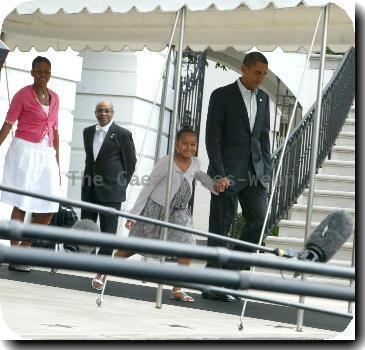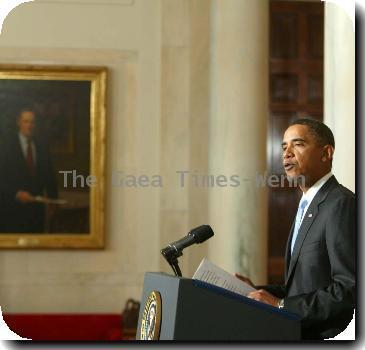NATO agrees to begin handing over control to Afghans; Clinton warns of rocky road
By Robert Burns, APFriday, April 23, 2010
Allies aim to begin handing control to Afghans
TALLINN, Estonia — NATO agreed to begin handing over command of the war in Afghanistan to the troubled Afghan government this year, a process that if successful would enable President Barack Obama to start bringing U.S. troops home by his target date of July 2011.
But the accord reached Friday appeared short on details and timelines, and U.S. Secretary of State Hillary Rodham Clinton warned of a rocky road ahead in a country beset with a resilient insurgency, limited resources and a weak, sometimes dysfunctional central government.
Clinton said she was pleased with progress toward eliminating the shortage of allied trainers for the Afghan army and police. She offered a generally sunny outlook for Afghanistan and said the government of much-criticized President Hamid Karzai gets too little credit for progress in building a viable democracy.
“We believe that with sufficient attention, training and mentoring, the Afghans themselves are perfectly capable of defending themselves against insurgents,” she told a news conference. “Does that mean it will be smooth sailing? I don’t think so. Look at Iraq.”
NATO is still about 450 short of its target for a training force to assist the Afghan security forces, and while that gap apparently was not filled during Friday’s session, Clinton said she was not discouraged.
“We have a relatively small gap that we’re still working to fill. I’m very convinced we’ll get that filled,” she said, adding: “For me, the glass is way more than half full.”
Mark Sedwill, the senior NATO civilian representative in Afghanistan, told reporters later that the Tallinn meeting’s agreement on starting a transition to Afghan control this year will require endorsement by the Afghan government. That is supposed to happen at a July conference in Kabul.
The next step would be an announcement at a NATO summit meeting in November of the first provinces targeted for transition to Afghan control, Sedwill said.
NATO Secretary General Anders Fogh Rasmussen said the 28-nation alliance is on track with its new strategy for winding down the war in Afghanistan, despite security setbacks and a continuing shortage of foreign trainers for the fledgling Afghan police and army.
“Our aims in 2010 are clear: to take the initiative against the insurgents, to help the Afghan government exercise its sovereignty, and to start handing over responsibility for Afghanistan to the Afghans this year,” he said.
He said a meeting of NATO foreign ministers, including Clinton, agreed on what it will take to create conditions enabling Afghans to assume control of their own country. He was not specific about what those conditions will be, but said progress in that direction is important in order to avoid further erosion of public support for the war effort.
“Where it occurs, the transition must be not just sustainable but irreversible,” Fogh Rasmussen told a news conference at the conclusion of the two-day meeting.
“Citizens in Afghanistan and in all troop contributing countries are demanding visible progress, and they are right to insist on that,” he added. “We should have no illusions. Making progress will not be easy and will not be quick. But based on what we see on the ground now, it is happening.”
He added that looking ahead to a winding down of the war does not mean the allies will leave before the mission is accomplished.
“It will not be a run for the exits,” he said.
In earlier remarks, Fogh Rasmussen offered a mostly upbeat assessment to the gathering.
“Increasingly this year the momentum will be ours,” he said.
Fogh Rasmussen asserted that the Afghan government, which has been hampered by a Taliban insurgency, political corruption, a dysfunctional economy and a dependence on foreign assistance, is starting to take more responsibility for running the country’s affairs.
“We are preparing to begin the process of handing over leadership, where conditions allow, back to the Afghan people,” he said. “The future of this mission is clear and visible: more Afghan capability and more Afghan leadership.”
During Friday’s meeting, which was closed to the press after Fogh Rasmussen made brief introductory remarks, Clinton was expected to press other NATO nations to provide more trainers for Afghanistan’s police and military forces as part of preparations to withdraw Western troops from there by summer 2011.
Fogh Rasmussen said Thursday that an additional 450 trainers are needed for Afghanistan’s security forces. Insufficient numbers of foreign trainers has plagued the U.S.-led war effort for years, although the shortfall has narrowed in recent months.
Friday’s session also was focusing on a NATO initiative aimed at stimulating the Afghan economy by making it a priority for all foreign contingents operating in Afghanistan to hire Afghan contractors and purchase Afghan goods and services whenever possible.
This “Afghan First” policy, as NATO calls it, has been deemed “the most important step in promoting the development of the Afghan private sector and supporting the economic development of the country,” according to a NATO statement issued Friday.
To underscore NATO’s effort to coordinate all aspects of its strategy and operations with the Afghan government, Afghan Foreign Minister Zalmai Rassoul was participating in the Tallinn meeting.
NATO’s assessment of its exit strategy comes just five months after Obama sharply escalated troop strength in the rugged mountain nation to challenge a resurgent Taliban movement.
NATO has struggled, in some cases, to coordinate military operations with Afghan civilian authorities and agencies.
In a speech Thursday before the two-day NATO meeting began, Fogh Rasmussen called Afghanistan the most challenging military operation undertaken by NATO in its history.
NATO was founded 61 years ago this month with the signing of a treaty of collective defense against a feared land invasion by the Soviet Union.
Today, Fogh Rasmussen said, instability in places far from Europe can threaten NATO member states.
“We all want to see a stable and secure Afghanistan — an Afghanistan that is no longer a threat to its region and to the rest of the world,” he said in his speech Thursday. “We will stay in Afghanistan as long as it takes to achieve that goal. We want to continue to empower the Afghans. And gradually hand over to them greater responsibility for the security of their own country when conditions permit.”
During Thursday’s talks, Clinton ruled out an early withdrawal of about 200 short-range U.S. nuclear weapons from bases in five European countries.
She said any reductions should be tied to a negotiated nuclear pullback by Russia, which has far more of the weapons in range of European targets.
No such talks are in the offing, and Moscow has shown little interest thus far in bargaining away its tactical nuclear arms.
Clinton also said the Obama administration wants NATO to accept missile defense as a core mission of the alliance.
The U.S. sees anti-missile systems as part of a broader effort to combat the dangers posed by nuclear, biological and chemical weapons and the rockets that can deliver them.
Some European members of NATO, including Germany, have said it’s time for the U.S. to withdraw its remaining Cold War-era nuclear weapons from Europe and cite Obama’s pledge in Prague last year to seek a nuclear-free world.
Tags: Afghanistan, Asia, Barack Obama, Central Asia, Eastern Europe, Estonia, Europe, North America, Nuclear Weapons, Tallinn, United States, Weapons Of Mass Destruction







